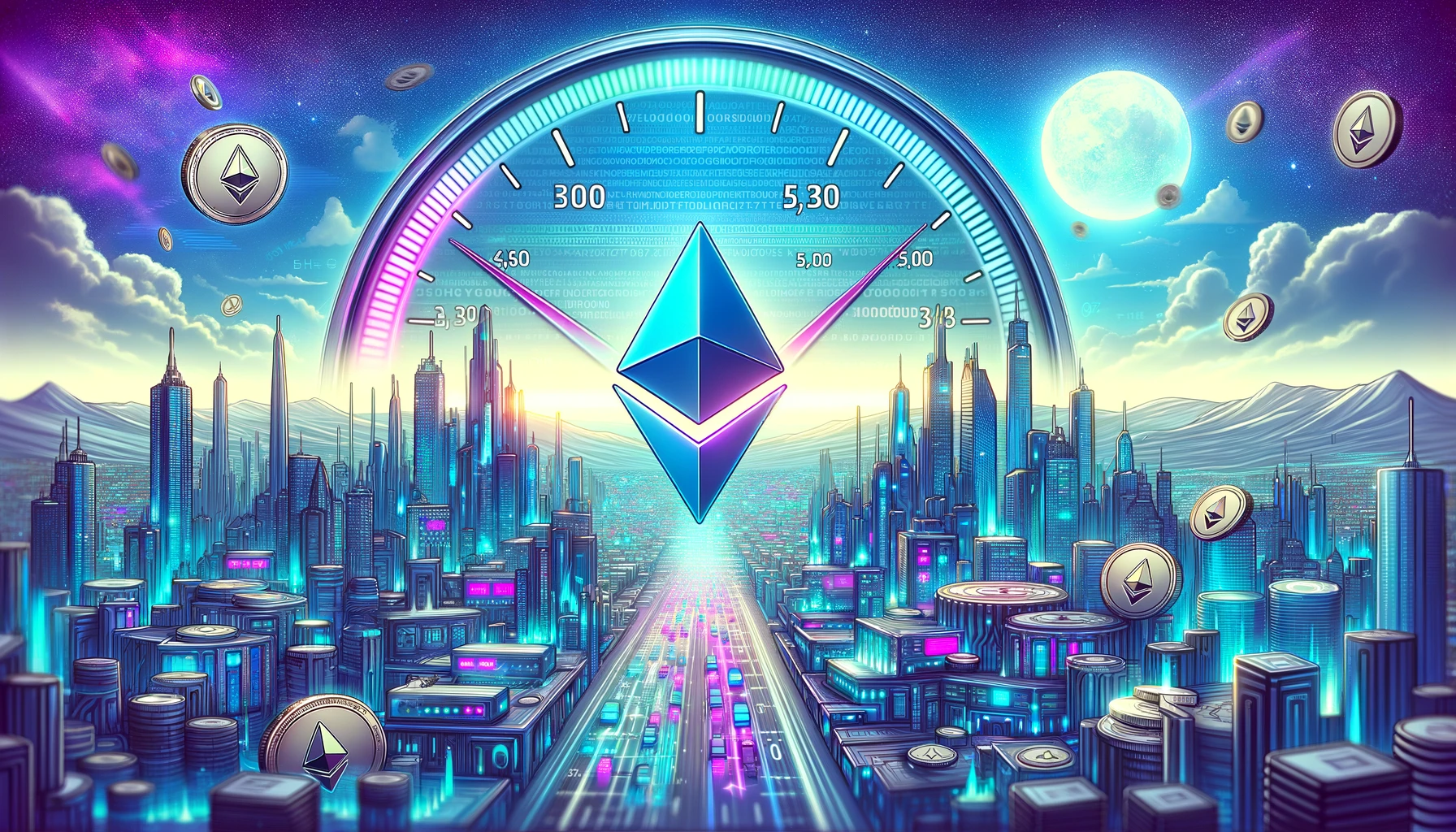15 Mar, 24
Ethereum Gas Fees: How Does GWEI Fluctuate?

Ethereum gas fees, a vital component for executing transactions on the Ethereum blockchain, are denominated in GWEI. Understanding how these fees fluctuate is crucial for anyone interacting with the network, from casual users to developers. This article delves into the mechanics behind Ethereum gas fees and provides insights into their variability.


What Are Ethereum Gas Fees?
Ethereum gas fees are payments made by users to compensate for the computational energy required to process and validate transactions on the Ethereum blockchain. These fees are paid in Ethereum’s native cryptocurrency, ether (ETH), but are quoted in GWEI, which is a smaller denomination of ETH.
Factors Influencing GWEI Fluctuation
Several key factors influence the fluctuation of GWEI, including network demand, transaction complexity, and blockchain congestion. High demand for Ethereum, often driven by popular decentralized applications (dApps), NFTs, or increased trading on decentralized exchanges (DEXs), can lead to higher gas fees. Moreover, the complexity of the transactions and the efficiency of the smart contracts involved play significant roles.
Ethereum’s Gas Fee Mechanism
Ethereum’s gas fee mechanism comprises three main components: the gas limit, the base fee, and the priority fee (tip). The gas limit is the maximum amount of gas the user is willing to spend on a transaction, while the base fee is the minimum amount of gas required to include a transaction in a block. The priority fee is an optional tip to incentivize miners or validators to process a transaction more quickly.
Strategies to Manage Gas Fees
Users can adopt several strategies to manage and potentially reduce their gas fees. These include selecting off-peak times for transactions when the network is less congested, adjusting the gas limit and priority fee settings in their wallets, and considering alternative scaling solutions like layer 2 networks.
Conclusion
Understanding the dynamics of Ethereum gas fees and the factors influencing GWEI fluctuations is essential for efficiently interacting with the Ethereum blockchain. By staying informed and strategically managing transactions, users can navigate the complexities of gas fees more effectively.
FAQs
- What is GWEI in the context of Ethereum?
- GWEI is a denomination of ETH, used to express gas prices on the Ethereum network. It stands for gigawei, with 1 GWEI equating to 1 billion wei, the smallest unit of ETH.
- Why do Ethereum gas fees fluctuate?
- Gas fees fluctuate based on network demand, transaction complexity, and overall blockchain congestion. Higher demand and more complex transactions typically lead to higher gas fees.
- What are the components of Ethereum gas fees?
- Ethereum gas fees consist of a base fee, which is burned, and a priority fee (tip), which is given to miners or validators as an incentive to include a transaction in the blockchain.
- How can users manage or reduce Ethereum gas fees?
- Users can manage or reduce gas fees by transacting during off-peak times, adjusting gas limit and priority fee settings, and utilizing layer 2 solutions for cheaper and faster transactions.
- What impact do decentralized applications (dApps) have on gas fees?
- Decentralized applications can significantly impact gas fees due to the computational resources required. Popular dApps or those with inefficient smart contracts can increase network demand and gas prices.
About Zerocap
Zerocap provides digital asset liquidity and digital asset custodial services to forward-thinking investors and institutions globally. For frictionless access to digital assets with industry-leading security, contact our team at [email protected] or visit our website www.zerocap.com
DISCLAIMER
This material is issued by Zerocap Pty Ltd (Zerocap), a Corporate Authorised Representative (CAR: 001289130) of AFSL 340799. Material covering regulated financial products is issued to you on the basis that you qualify as a “Wholesale Investor” for the purposes of Sections 761GA and 708(10) of the Corporations Act 2001 (Cth) (Sophisticated/Wholesale Client). This material is intended solely for the information of the particular person to whom it was provided by Zerocap and should not be relied upon by any other person. The information contained in this material is general in nature and does not constitute advice, take into account the financial objectives or situation of an investor; nor a recommendation to deal. Any recipients of this material acknowledge and agree that they must conduct and have conducted their own due diligence investigation and have not relied upon any representations of Zerocap, its officers, employees, representatives or associates. Zerocap has not independently verified the information contained in this material. Zerocap assumes no responsibility for updating any information, views or opinions contained in this material or for correcting any error or omission which may become apparent after the material has been issued. Zerocap does not give any warranty as to the accuracy, reliability or completeness of advice or information which is contained in this material. Except insofar as liability under any statute cannot be excluded, Zerocap and its officers, employees, representatives or associates do not accept any liability (whether arising in contract, in tort or negligence or otherwise) for any error or omission in this material or for any resulting loss or damage (whether direct, indirect, consequential or otherwise) suffered by the recipient of this material or any other person. This is a private communication and was not intended for public circulation or publication or for the use of any third party. This material must not be distributed or released in the United States. It may only be provided to persons who are outside the United States and are not acting for the account or benefit of, “US Persons” in connection with transactions that would be “offshore transactions” (as such terms are defined in Regulation S under the U.S. Securities Act of 1933, as amended (the “Securities Act”)). This material does not, and is not intended to, constitute an offer or invitation in the United States, or in any other place or jurisdiction in which, or to any person to whom, it would not be lawful to make such an offer or invitation. If you are not the intended recipient of this material, please notify Zerocap immediately and destroy all copies of this material, whether held in electronic or printed form or otherwise.
Disclosure of Interest: Zerocap, its officers, employees, representatives and associates within the meaning of Chapter 7 of the Corporations Act may receive commissions and management fees from transactions involving securities referred to in this material (which its representatives may directly share) and may from time to time hold interests in the assets referred to in this material. Investors should consider this material as only a single factor in making their investment decision.
Like this article? Share
Latest Insights
Weekly Crypto Market Wrap: 2 February 2026
Zerocap is a market-leading digital asset firm, providing trading, liquidity and custody to forward-thinking institutions and investors globally. To learn more, contact the team at
Weekly Crypto Market Wrap: 19 January 2026
Zerocap is a market-leading digital asset firm, providing trading, liquidity and custody to forward-thinking institutions and investors globally. To learn more, contact the team at
Weekly Crypto Market Wrap: 12 January 2026
Zerocap is a market-leading digital asset firm, providing trading, liquidity and custody to forward-thinking institutions and investors globally. To learn more, contact the team at
Receive Our Insights
Subscribe to receive our publications in newsletter format — the best way to stay informed about crypto asset market trends and topics.



 Share
Share  Tweet
Tweet  Post
Post 